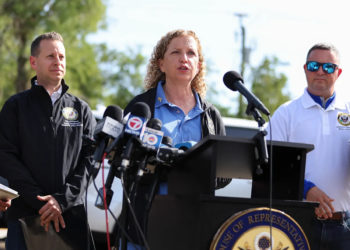The EU is delaying retaliatory tariffs on US goods in hopes of reaching a deal by Aug. 1
BRUSSELS (AP) — The European Union will suspend retaliatory tariffs on U.S. goods scheduled to take effect Monday in hopes...
Trump says he’s considering revoking Rosie O’Donnell’s citizenship, reigniting decades-long feud
President Donald Trump reignited a decades-long feud with comedian Rosie O’Donnell Saturday, taking to his Truth Social platform to write...
Before Butler, Secret Service denied requests to bolster Trump’s security, report says
Sen. Rand Paul, the author of the Senate report, will join "Face the Nation with Margaret Brennan" at 10:30 a.m....
Trump faces a revolt from his MAGA base over the Epstein files
TAMPA, Fla. — On the weekend President Donald Trump decided to pick his biggest political fight to date with the...
Unconventional relationship holds answers to violent Florida murder
This story originally aired on Oct. 19, 2024. It was updated on July 12, 2025.In April 2018, in the sleepy...
Ukraine’s security agency says it killed Russian agents suspected of gunning down its officer
KYIV, Ukraine (AP) — Ukraine's security agency said Sunday it tracked down and killed Russian agents suspected of shooting one...
Here’s how a $1,000 ‘Trump account’ could swell to $100,000 by age 21—and $2 million by 60—even with modest contributions from families
The One Big Beautiful Bill that was signed into law last week includes a provision for so-called Trump accounts that...
Lena Dunham says Taylor Swift is responsible for one of her favorite ‘Too Much’ moments
Spoiler alert! The following story contains major details about the ending of "The Idea of Glue," the 10th episode of...
Woman Sparks Debate After She Says She Was ‘Raging’ Because Her Grown Children Avoided Meeting Their Cousins’ New Baby
NEED TO KNOWA woman is livid because her grown children didn’t make an effort to meet their cousins’ new babyThe...
Lawmakers visit ‘Alligator Alcatraz’ after being blocked
OCHOPEE, Fla. (AP) — Democratic lawmakers condemned Florida's new Everglades immigration detention center after visiting Saturday, describing it as crowded,...















